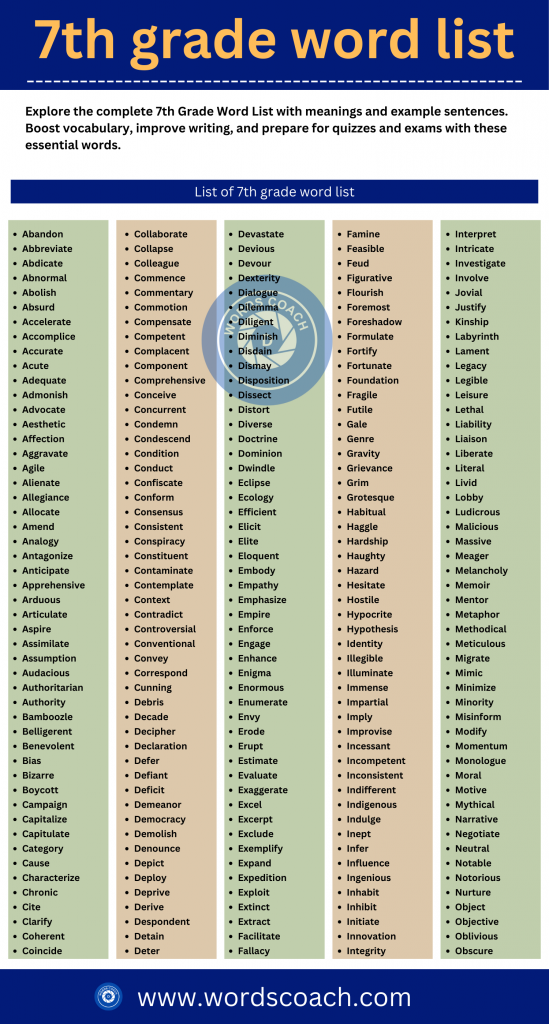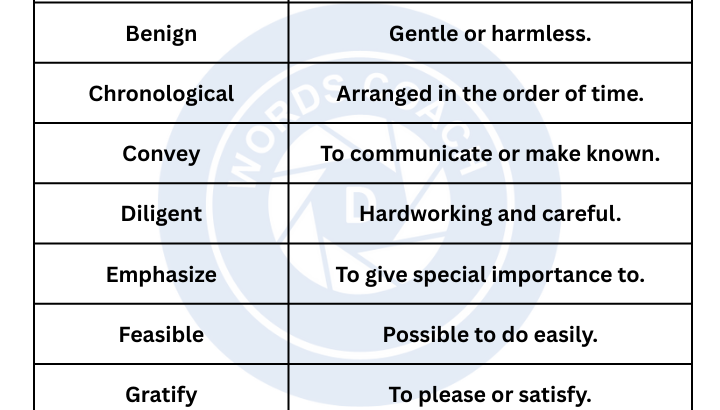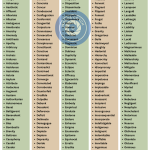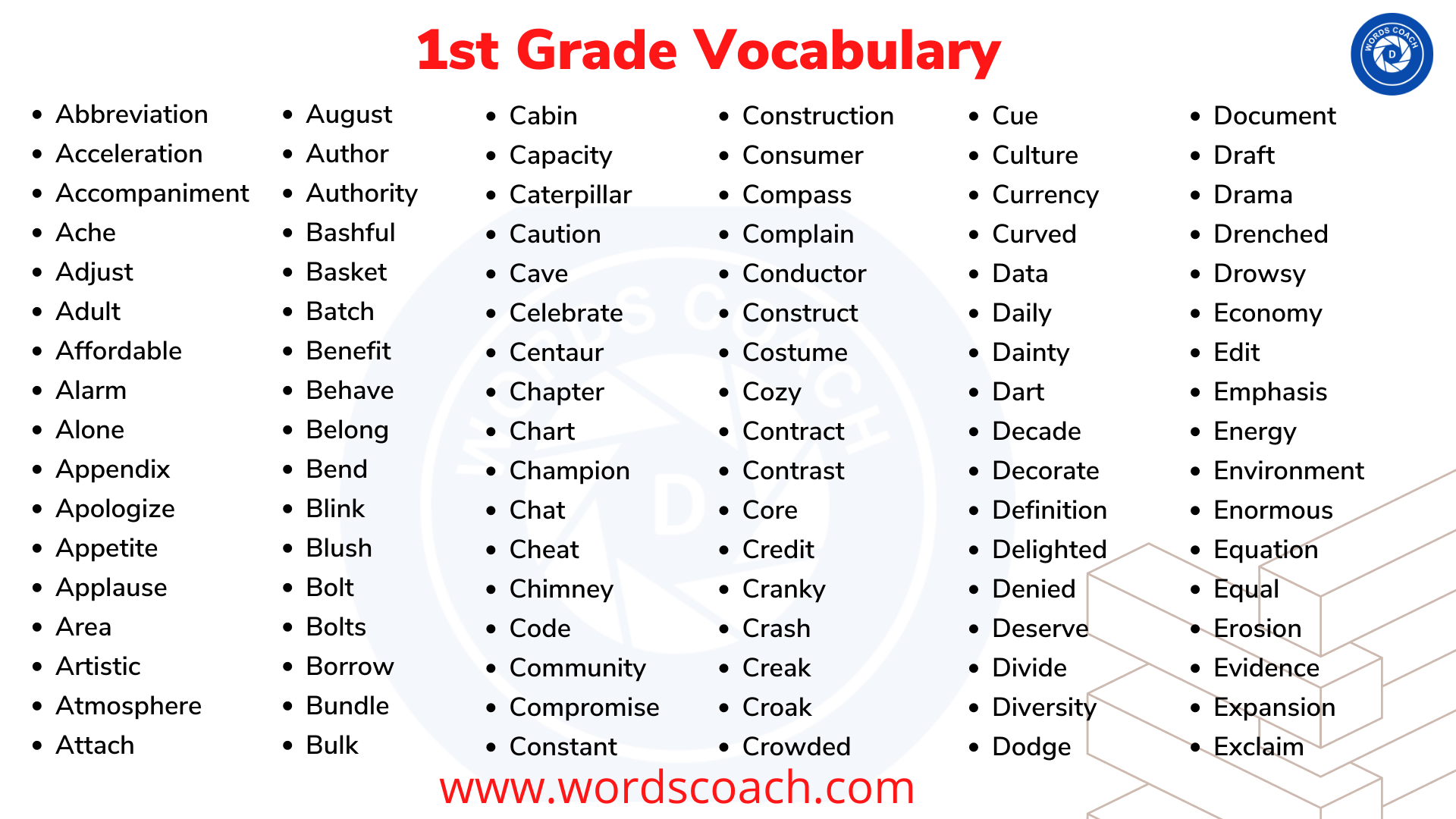7th grade word list
Learning new words is an exciting part of growing as a reader, writer, and communicator. By the time students reach 7th grade, they are ready to explore more advanced vocabulary that helps them express ideas clearly and understand challenging texts. A strong word list builds confidence, improves comprehension, and prepares students for academic success.
7th Grade Word List with the meaning
| Word | Meaning |
|---|---|
| Abandon (v.) | To give up completely; to leave permanently |
| Abbreviate (v.) | To shorten a word or phrase |
| Abdicate (v.) | To give up a throne, power, or responsibility |
| Abnormal (adj.) | Not typical, usual, or regular; deviant |
| Abolish (v.) | To formally put an end to a system, practice, or institution |
| Absurd (adj.) | Wildly unreasonable, illogical, or inappropriate |
| Accelerate (v.) | To increase in speed or rate |
| Accomplice (n.) | A person who helps another commit a crime |
| Accurate (adj.) | Correct in all details; exact |
| Acute (adj.) | (1) Very serious or severe; (2) Sharp or shrewd |
| Adequate (adj.) | Satisfactory or acceptable in quality or quantity |
| Admonish (v.) | To warn or reprimand someone firmly |
| Advocate (v.) | To publicly recommend or support (n.) – A person who supports a cause |
| Aesthetic (adj.) | Concerned with beauty or the appreciation of beauty |
| Affection (n.) | A gentle feeling of fondness or liking |
| Aggravate (v.) | To make a problem, injury, or offense worse or more serious |
| Agile (adj.) | Able to move quickly and easily |
| Alienate (v.) | To cause someone to feel isolated or estranged |
| Allegiance (n.) | Loyalty or commitment to a person, group, or cause |
| Allocate (v.) | To distribute resources or duties for a specific purpose |
| Amend (v.) | To make minor changes to improve or correct |
| Analogy (n.) | A comparison between two things to show their similarities |
| Antagonize (v.) | To cause someone to become hostile |
| Anticipate (v.) | To regard as probable; expect or predict |
| Apprehensive (adj.) | Anxious or fearful that something bad will happen |
| Arduous (adj.) | Involving or requiring strenuous effort; difficult and tiring |
| Articulate (v.) | To express an idea or feeling fluently and coherently (adj.) – Having this ability |
| Aspire (v.) | To direct one’s hopes or ambitions toward achieving something |
| Assimilate (v.) | To take in and understand fully; to integrate |
| Assumption (n.) | A thing that is accepted as true without proof |
| Audacious (adj.) | Showing a willingness to take surprisingly bold risks |
| Authoritarian (adj.) | Favoring or enforcing strict obedience to authority |
| Authority (n.) | The power or right to give orders and enforce obedience |
| Bamboozle (v.) | To fool or cheat someone |
| Belligerent (adj.) | Hostile and aggressive |
| Benevolent (adj.) | Well-meaning and kindly |
| Bias (n.) | Prejudice in favor of or against one thing, person, or group |
| Bizarre (adj.) | Very strange or unusual |
| Boycott (v.) | To withdraw from commercial or social relations as a punishment or protest |
| Campaign (n.) | A series of military operations or organized course of action (v.) – To work in an organized way toward a goal |
| Capitalize (v.) | (1) To write in capital letters; (2) To gain an advantage from |
| Capitulate (v.) | To cease to resist an opponent or an unwelcome demand; surrender |
| Category (n.) | A class or division of people or things regarded as having shared characteristics |
| Cause (n.) | A person or thing that gives rise to an action, phenomenon, or condition |
| Characterize (v.) | To describe the distinctive nature or features of |
| Chronic (adj.) | (Of an illness) persisting for a long time; constant |
| Cite (v.) | To quote as evidence for or justification of an argument |
| Clarify (v.) | To make a statement or situation less confused and more comprehensible |
| Coherent (adj.) | (Of an argument, theory, or policy) logical and consistent |
| Coincide (v.) | To occur at the same time |
| Collaborate (v.) | To work jointly on an activity or project |
| Collapse (v.) | To suddenly fall down or give way |
| Colleague (n.) | A person with whom one works, especially in a profession or business |
| Commence (v.) | To begin |
| Commentary (n.) | An expression of opinions or offering of explanations about an event or situation |
| Commotion (n.) | A state of confused and noisy disturbance |
| Compensate (v.) | To give someone something, typically money, in recognition of loss, suffering, or injury |
| Competent (adj.) | Having the necessary ability, knowledge, or skill to do something successfully |
| Complacent (adj.) | Showing smug or uncritical satisfaction with oneself or one’s achievements |
| Component (n.) | A part or element of a larger whole |
| Comprehensive (adj.) | Complete; including all or nearly all elements of something |
| Conceive (v.) | To form or devise a plan or idea in the mind |
| Concurrent (adj.) | Existing, happening, or done at the same time |
| Condemn (v.) | To express complete disapproval of; to sentence |
| Condescend (v.) | To show feelings of superiority; to be patronizing |
| Condition (n.) | The state of something; a circumstance (v.) – To train or adapt |
| Conduct (v.) | To organize and carry out (n.) – Behavior |
| Confiscate (v.) | To take or seize someone’s property with authority |
| Conform (v.) | To comply with rules, standards, or laws |
| Consensus (n.) | A general agreement |
| Consistent (adj.) | Acting or done in the same way over time; unchanging |
| Conspiracy (n.) | A secret plan by a group to do something unlawful or harmful |
| Constituent (n.) | A part of a whole; a voter in a district (adj.) – Being a part of a whole |
| Contaminate (v.) | To make something impure by exposure to or addition of a poisonous substance |
| Contemplate (v.) | To look thoughtfully for a long time; to think deeply |
| Context (n.) | The circumstances that form the setting for an event or idea |
| Contradict (v.) | To deny the truth of a statement by asserting the opposite |
| Controversial (adj.) | Giving rise or likely to give rise to public disagreement |
| Conventional (adj.) | Based on or in accordance with what is generally done or believed |
| Convey (v.) | To transport or carry; to communicate |
| Correspond (v.) | (1) To communicate by letter; (2) To have a close similarity |
| Cunning (adj.) | Having or showing skill in achieving one’s ends by deceit |
| Debris (n.) | Scattered pieces of waste or remains |
| Decade (n.) | A period of ten years |
| Decipher (v.) | To convert a coded message into normal language; to understand |
| Declaration (n.) | A formal or explicit statement or announcement |
| Defer (v.) | To put off to a later time; postpone |
| Defiant (adj.) | Showing open resistance or bold disobedience |
| Deficit (n.) | The amount by which something, especially money, is too small |
| Demeanor (n.) | Outward behavior or bearing |
| Democracy (n.) | A system of government by the whole population |
| Demolish (v.) | To pull or knock down a building; to destroy |
| Denounce (v.) | To publicly declare to be wrong or evil |
| Depict (v.) | To show or represent by a drawing, painting, or other art form |
| Deploy (v.) | To bring into effective action; to position troops |
| Deprive (v.) | To deny the possession or use of something |
| Derive (v.) | To obtain something from a specified source |
| Despondent (adj.) | In low spirits from loss of hope or courage |
| Detain (v.) | To keep someone from proceeding; to hold in custody |
| Deter (v.) | To discourage someone from doing something by instilling doubt or fear of the consequences |
| Devastate (v.) | To destroy or ruin |
| Devious (adj.) | Showing a skillful use of underhanded tactics to achieve goals |
| Devour (v.) | To eat hungrily or quickly; to read eagerly |
| Dexterity (n.) | Skill in performing tasks, especially with the hands |
| Dialogue (n.) | Conversation between two or more people |
| Dilemma (n.) | A situation in which a difficult choice has to be made between alternatives |
| Diligent (adj.) | Having or showing care and conscientiousness in one’s work or duties |
| Diminish (v.) | To make or become less |
| Disdain (n.) | The feeling that someone or something is unworthy of one’s consideration or respect |
| Dismay (n.) | Consternation and distress (v.) – To cause to feel distress |
| Disposition (n.) | A person’s inherent qualities of mind and character |
| Dissect (v.) | To methodically cut up a body or plant to study its internal parts; to analyze in detail |
| Distort (v.) | To pull or twist out of shape; to misrepresent |
| Diverse (adj.) | Showing a great deal of variety; very different |
| Doctrine (n.) | A belief or set of beliefs held and taught by a church, political party, or other group |
| Dominion (n.) | Sovereignty or control |
| Dwindle (v.) | To diminish gradually in size, amount, or strength |
| Eclipse (n.) | An obscuring of light from one celestial body by another (v.) – To overshadow |
| Ecology (n.) | The branch of biology that deals with the relations of organisms to one another and to their physical surroundings |
| Efficient (adj.) | Achieving maximum productivity with minimum wasted effort or expense |
| Elicit (v.) | To evoke or draw out a response or fact |
| Elite (n.) | A select group that is superior in terms of ability or qualities |
| Eloquent (adj.) | Fluent or persuasive in speaking or writing |
| Embody (v.) | To be an expression of or give a tangible form to an idea or quality |
| Empathy (n.) | The ability to understand and share the feelings of another |
| Emphasize (v.) | To give special importance or prominence to something in speaking or writing |
| Empire (n.) | An extensive group of states or countries under a single supreme authority |
| Enforce (v.) | To compel observance of or compliance with a law or rule |
| Engage (v.) | To occupy, attract, or involve someone’s interest; to participate |
| Enhance (v.) | To intensify, increase, or further improve the quality or value of |
| Enigma (n.) | A person or thing that is mysterious, puzzling, or difficult to understand |
| Enormous (adj.) | Very large in size, quantity, or extent |
| Enumerate (v.) | To mention a number of things one by one |
| Envy (n.) | A feeling of discontented or resentful longing aroused by someone else’s possessions or qualities |
| Erode (v.) | To gradually wear away |
| Erupt (v.) | To break out suddenly and dramatically |
| Estimate (v.) | To roughly calculate or judge the value of (n.) – An approximate calculation |
| Evaluate (v.) | To form an idea of the amount, number, or value of; assess |
| Exaggerate (v.) | To represent something as being larger, greater, better, or worse than it really is |
| Excel (v.) | To be exceptionally good at or proficient in an activity or subject |
| Excerpt (n.) | A short extract from a film, broadcast, or piece of writing or music |
| Exclude (v.) | To deny someone access to or bar from a place, group, or privilege |
| Exemplify (v.) | To be a typical example of |
| Expand (v.) | To become or make larger or more extensive |
| Expedition (n.) | A journey undertaken by a group of people with a particular purpose |
| Exploit (v.) | To make full use of and derive benefit from (a resource) (n.) – A bold or heroic feat |
| Extinct (adj.) | (Of a species, family, or other group of animals or plants) having no living members |
| To remove or take out, especially by effort or force (n.) – A short passage taken from a text or piece of music | |
| Facilitate (v.) | To make an action or process easy or easier |
| Fallacy (n.) | A mistaken belief, especially one based on unsound argument |
| Famine (n.) | Extreme scarcity of food |
| Feasible (adj.) | Possible to do easily or conveniently |
| Feud (n.) | A prolonged and bitter quarrel or dispute |
| Figurative (adj.) | Departing from a literal use of words; metaphorical |
| Flourish (v.) | To grow or develop in a healthy or vigorous way |
| Foremost (adj.) | Most prominent in rank, importance, or position |
| Foreshadow (v.) | To be a warning or indication of a future event |
| Formulate (v.) | To create or devise methodically |
| Fortify (v.) | To strengthen a place with defensive works so as to protect it against attack |
| Fortunate (adj.) | Favored by or involving good luck; lucky |
| Foundation (n.) | The lowest load-bearing part of a building; the basis on which something is grounded |
| Fragile (adj.) | Easily broken or damaged |
| Futile (adj.) | Incapable of producing any useful result; pointless |
| Gale (n.) | A very strong wind |
| Genre (n.) | A category of artistic composition, as in music or literature, characterized by similarities in form, style, or subject matter |
| Gravity (n.) | (1) The force that attracts a body toward the center of the earth; (2) Extreme importance or seriousness |
| Grievance (n.) | A real or imagined cause for complaint, especially unfair treatment |
| Grim (adj.) | Very serious or gloomy |
| Grotesque (adj.) | Comically or repulsively ugly or distorted |
| Habitual (adj.) | Done constantly or as a habit |
| Haggle (v.) | To dispute or bargain persistently, especially over the cost of something |
| Hardship (n.) | Severe suffering or privation |
| Haughty (adj.) | Arrogantly superior and disdainful |
| Hazard (n.) | A danger or risk (v.) – To offer a suggestion or risk a guess |
| Hesitate (v.) | To pause before saying or doing something |
| Hostile (adj.) | Unfriendly; antagonistic |
| Hypocrite (n.) | A person who pretends to have virtues, moral or religious beliefs that they do not actually possess |
| Hypothesis (n.) | A supposition or proposed explanation made on the basis of limited evidence as a starting point for further investigation |
| Identity (n.) | The fact of being who or what a person or thing is |
| Illegible (adj.) | Not clear enough to be read |
| Illuminate (v.) | To light up; to help to clarify or explain |
| Immense (adj.) | Extremely large or great, especially in scale or degree |
| Impartial (adj.) | Treating all rivals or disputants equally; fair and just |
| Imply (v.) | To strongly suggest the truth or existence of something not expressly stated |
| Improvise (v.) | To create and perform spontaneously or without preparation |
| Incessant (adj.) | Continuing without pause or interruption |
| Incompetent (adj.) | Not having or showing the necessary skills to do something successfully |
| Inconsistent (adj.) | Not staying the same throughout |
| Indifferent (adj.) | Having no particular interest or sympathy; unconcerned |
| Indigenous (adj.) | Originating or occurring naturally in a particular place; native |
| Indulge (v.) | To allow oneself to enjoy the pleasure of |
| Inept (adj.) | Having or showing no skill; clumsy |
| Infer (v.) | To deduce or conclude information from evidence and reasoning rather than from explicit statements |
| Influence (n.) | The capacity to have an effect on the character, development, or behavior of someone or something |
| Ingenious (adj.) | (Of a person) clever, original, and inventive |
| Inhabit (v.) | To live in or occupy a place or environment |
| Inhibit (v.) | To hinder, restrain, or prevent an action or process |
| Initiate (v.) | To cause a process or action to begin |
| Innovation (n.) | A new method, idea, product, etc. |
| Integrity (n.) | The quality of being honest and having strong moral principles |
| Interpret (v.) | To explain the meaning of information or actions |
| Intricate (adj.) | Very complicated or detailed |
| Investigate (v.) | To carry out a systematic or formal inquiry to discover and examine facts |
| Involve (v.) | To have or include as a necessary part or result |
| Jovial (adj.) | Cheerful and friendly |
| Justify (v.) | To show or prove to be right or reasonable |
| Kinship (n.) | Blood relationship; a sharing of characteristics or origins |
| Labyrinth (n.) | A complicated irregular network of passages; a maze |
| Lament (v.) | To express sorrow or regret; to mourn |
| Legacy (n.) | Something handed down by a predecessor |
| Legible (adj.) | Clear enough to be read |
| Leisure (n.) | Free time |
| Lethal (adj.) | Sufficient to cause death |
| Liability (n.) | The state of being legally responsible for something; a person or thing likely to cause a problem |
| Liaison (n.) | Communication or cooperation which facilitates a close working relationship |
| Liberate (v.) | To set someone free from a situation, especially imprisonment or oppression |
| Literal (adj.) | Taking words in their usual or most basic sense without metaphor or allegory |
| Livid (adj.) | Furiously angry |
| Lobby (v.) | To seek to influence a politician on an issue (n.) – A group engaged in this |
| Ludicrous (adj.) | So foolish, unreasonable, or out of place as to be amusing |
| Malicious (adj.) | Characterized by a desire to harm someone |
| Massive (adj.) | Large and heavy or solid |
| Meager (adj.) | Lacking in quantity or quality |
| Melancholy (n.) | A feeling of pensive sadness, typically with no obvious cause (adj.) – Sad and gloomy |
| Memoir (n.) | A historical account or biography written from personal knowledge |
| Mentor (n.) | An experienced and trusted adviser (v.) – To advise or train |
| Metaphor (n.) | A figure of speech that directly compares two unrelated things |
| Methodical (adj.) | Done according to a systematic or established procedure |
| Meticulous (adj.) | Showing great attention to detail; very careful and precise |
| Migrate (v.) | To move from one region or habitat to another, especially regularly according to the seasons |
| Mimic (v.) | To imitate someone or something, typically to entertain or ridicule |
| Minimize (v.) | To reduce something to the smallest possible amount or degree |
| Minority (n.) | The smaller number or part, especially a number that is less than half the whole number |
| Misinform (v.) | To give false or misleading information to |
| Modify (v.) | To make partial or minor changes to something |
| Momentum (n.) | The quantity of motion of a moving body; the impetus gained by a moving object |
| Monologue (n.) | A long speech by one actor in a play or movie |
| Moral (adj.) | Concerned with the principles of right and wrong behavior (n.) – A lesson learned from a story or event |
| Motive (n.) | A reason for doing something |
| Mythical (adj.) | Occurring in or characteristic of myths or folk tales; imaginary |
| Narrative (n.) | A spoken or written account of connected events; a story |
| Negotiate (v.) | To try to reach an agreement or compromise by discussion |
| Neutral (adj.) | Not supporting or helping either side in a conflict or disagreement |
| Notable (adj.) | Worthy of attention or notice; remarkable |
| Notorious (adj.) | Famous or well-known, typically for some bad quality or deed |
| Nurture (v.) | To care for and encourage the growth or development of (n.) – Upbringing, education, and environment |
| Object (v.) | To express or feel disapproval, dislike, or disagreement |
| Objective (adj.) | Not influenced by personal feelings or opinions in considering facts (n.) – A goal or aim |
| Oblivious (adj.) | Not aware of or concerned about what is happening around one |
| Obscure (adj.) | Not discovered or known about; uncertain (v.) – To keep from being seen; to conceal |
| Observe (v.) | To notice or perceive something and register it as being significant |
| Obsolete (adj.) | No longer produced or used; out of date |
| Obstacle (n.) | A thing that blocks one’s way or prevents or hinders progress |
| Oppose (v.) | To disapprove of and attempt to prevent, especially by argument |
| Oppress (v.) | To keep someone in subservience and hardship, especially by the unjust exercise of authority |
| Origin (n.) | The point or place where something begins, arises, or is derived |
| Originate (v.) | To have a specified beginning |
| Ornate (adj.) | Made in an intricate shape or decorated with complex patterns |
| Paraphrase (v.) | To express the meaning of something using different words (n.) – A rewording of something |
| Partial (adj.) | Existing only in part; incomplete; biased |
| Perceive (v.) | To become aware or conscious of something through the senses |
| Peril (n.) | Serious and immediate danger |
| Persecute (v.) | To subject someone to hostility and ill-treatment, especially because of their race or political or religious beliefs |
| Persevere (v.) | To continue in a course of action even in the face of difficulty or with little or no prospect of success |
| Persistent (adj.) | Continuing firmly or obstinately in a course of action in spite of difficulty or opposition |
| Perspective (n.) | A particular attitude toward or way of regarding something; a point of view |
| Persuade (v.) | To cause someone to do something through reasoning or argument |
| Phenomenon (n.) | A fact or situation that is observed to exist or happen, especially one whose cause or explanation is in question |
| Pioneer (n.) | A person who is among the first to explore or settle a new country or area |
| Plagiarism (n.) | The practice of taking someone else’s work or ideas and passing them off as one’s own |
| Ponder (v.) | To think about something carefully, especially before making a decision |
| Potential (adj.) | Having or showing the capacity to develop into something in the future |
| Pragmatic (adj.) | Dealing with things sensibly and realistically |
| Precede (v.) | To come before something in time, order, or position |
| Precise (adj.) | Marked by exactness and accuracy of expression or detail |
| Predominant (adj.) | Present as the strongest or main element |
| Prejudice (n.) | Preconceived opinion that is not based on reason or actual experience |
| Premise (n.) | A previous statement or proposition from which another is inferred or follows as a conclusion; the basis of an argument |
| Presume (v.) | To suppose that something is the case on the basis of probability |
| Prevail (v.) | To prove more powerful than opposing forces; to be victorious |
| Priority (n.) | The fact or condition of being regarded or treated as more important than others |
| Privilege (n.) | A special right, advantage, or immunity granted or available only to a particular person or group |
| Procedure (n.) | An established or official way of doing something |
| Profound (adj.) | Very great or intense; having or showing great knowledge or insight |
| Prolific (adj.) | Present in large numbers or quantities; plentiful |
| Prominent (adj.) | Important; famous; projecting from something |
| Proponent (n.) | A person who advocates a theory, proposal, or course of action |
| Prose (n.) | Written or spoken language in its ordinary form, without metrical structure (as opposed to poetry) |
| Prosper (v.) | To succeed in material terms; to be financially successful |
| Provoke (v.) | To stimulate or give rise to a reaction or emotion, typically a strong or unwelcome one |
| Pursue (v.) | To follow or chase someone or something; to continue with a course of action |
| Qualitative (adj.) | Relating to, measuring, or measured by the quality of something rather than its quantity |
| Quantitative (adj.) | Relating to, measuring, or measured by the quantity of something rather than its quality |
| Quandary (n.) | A state of perplexity or uncertainty over what to do in a difficult situation |
| Quarrel (n.) | A heated argument or disagreement (v.) – To have a heated argument |
| Query (n.) | A question, especially one expressing doubt (v.) – To ask a question about something |
| Radical (adj.) | Relating to or affecting the fundamental nature of something; far-reaching or thorough |
| Rational (adj.) | Based on or in accordance with reason or logic |
| Reconcile (v.) | To restore friendly relations between; to make compatible |
| Redundant (adj.) | Not or no longer needed or useful; superfluous |
| Refuge (n.) | A condition of being safe or sheltered from pursuit, danger, or trouble |
| Regime (n.) | A government, especially an authoritarian one |
| Reinforce (v.) | To strengthen or support |
| Relevant (adj.) | Closely connected or appropriate to the matter at hand |
| Reluctant (adj.) | Unwilling and hesitant; disinclined |
| Rely (v.) | To depend on with full trust or confidence |
| Remorse (n.) | Deep regret or guilt for a wrong committed |
| Renounce (v.) | To formally declare one’s abandonment of a claim, right, or possession |
| Reprimand (n.) | A formal expression of disapproval (v.) – To address a reprimand to |
| Reputation (n.) | The beliefs or opinions that are generally held about someone or something |
| Resilient (adj.) | Able to withstand or recover quickly from difficult conditions |
| Resolve (v.) | To settle or find a solution to a problem or dispute; to decide firmly on a course of action (n.) – Firm determination |
| Resonate (v.) | To evoke a feeling of shared emotion or belief; to produce a deep, full, reverberating sound |
| Resourceful (adj.) | Having the ability to find quick and clever ways to overcome difficulties |
| Responsible (adj.) | Having an obligation to do something, or having control over or care for someone |
| Restrain (v.) | To prevent someone or something from doing something; to keep under control |
| Retaliate (v.) | To make an attack or assault in return for a similar attack |
| Retrieve (v.) | To get or bring something back from somewhere |
| Reverberate (v.) | To be repeated several times as an echo; to have continuing and serious effects |
| Reverence (n.) | Deep respect for someone or something |
| Revolution (n.) | A forcible overthrow of a government or social order, in favor of a new system; a dramatic and wide-reaching change |
| Ritual (n.) | A religious or solemn ceremony consisting of a series of actions performed according to a prescribed order |
| Rural (adj.) | In, relating to, or characteristic of the countryside rather than the town |
The 7th Grade Word List is designed to help students improve vocabulary step by step. By learning these words with definitions and examples, students can enhance reading comprehension, writing, and communication skills. With practice, these words will soon become part of their everyday language.
Want to Learn More?
| 5th Grade Word List | 100+ Hard Words to Spell with Their Meanings | 75+ Difficult Words to Pronounce |
| C2 Vocabulary Exercise | The Most Overused Words in English | 100+ Simple Words with Meaning |
Download Word Coach Application






